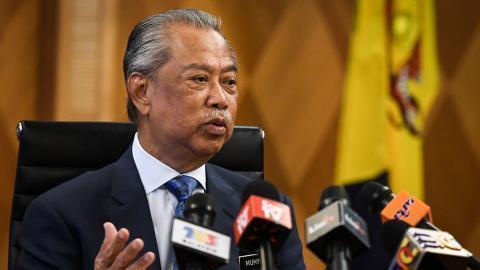The Syrian army has imposed a no-fly zone over the country's battlefield Idlib Province.
A statement says any aircraft violating the airspace will be dealt with as a hostile target and will be shot down.
The new decision comes on the heels of the current tension with Turkey, which is backing the rebel groups in Idlib.
A day earlier, tens of Syrian soldiers were killed in the province by Turkish drone attacks.
The Chinese mainland reported three new COVID-19 infections on Saturday outside Hubei Province.
Meanwhile, 570 confirmed cases and 34 deaths were reported in the hardest-hit province.
On the same day, over 2,600 people were discharged from hospital after recovery.
South Korea reported close to 600 new COVID-19 infections on Sunday, raising the total number of confirmed cases to over 3,700.
The country also reported one more death, lifting the combined death toll to 18.
Also on Sunday, the government decided to temporarily close churches nationwide to rein in public gatherings.
Australia and Thailand have reported the first deaths of COVID-19 patients.
The victim in Australia was an elderly man from Perth.
He contracted the coronavirus on board the Diamond Princess cruise ship in Japan.
In Thailand, a patient died several days after he tested negative for the virus.
Health officials suggest that he remained in a serious condition due to organ damage.
The United States has announced additional travel restrictions on Iran and raised travel advisories for certain areas of Italy and South Korea over coronavirus concerns.
The country is expanding existing travel restrictions on Iran to include any foreign national who has visited the country within the last 14 days.
It's also urging Americans not to travel to certain regions of Italy and South Korea which are most affected by the virus.
The move comes after the report of the first patient death in the country.
The World Health Organization has explained why it raised the global risk level of COVID-19 from high to very high.
Director-General Tedros Adhanom Ghebreyesus says one reason is the "difficulty in identifying cases due to non-specific symptoms and the potential of undetected transmission."
The second is the "potential for major impact on healthcare systems in some affected and potentially affected countries."
He also cites the "spread of the new coronavirus and countries' capacity to respond" as the basis for raising the risk level.
The United States has signed a historic deal with the Afghan Taliban that could pave the way toward a full withdrawal of foreign soldiers from Afghanistan over the next 14 months.
The deal was signed in the Qatari capital Doha on Saturday.
An initial reduction of troops to 8,600 is expected to be completed within 135 days of Saturday's signing.
The U.S. currently has between 12,000 and 13,000 troops in Afghanistan.
Joe Biden has scored a convincing victory in South Carolina's Democratic primary.
It comes at a crucial moment in his bid as the moderate Democrat bounced back from underwhelming performances in the first three contests.
The race now quickly shifts toward next week's "Super Tuesday," when voters in 14 states award one third of the total number of presidential delegates.
Biden hopes the latest victory will be enough to establish him as the clear alternative to Bernie Sanders as the race moves into a new phase.
Muhyiddin Yassin has taken the oath of office to become Malaysia's new prime minister.
The former deputy prime minister was appointed following the abrupt resignation of 94-year-old Mahathir Mohamad, who had been in office since the general elections in 2018.

China government bonds have been officially included in the series of the Government Bond Index-Emerging Markets indices of J.P. Morgan.
China's central bank suggests the move reflects the trust of the international investors in the long-term trajectory of the Chinese economy and their recognition of the opening level of China's financial market.
At the end of January, China's total outstanding bonds reached over 100 trillion yuan, over 2.2 trillion yuan of which was held by international investors, up 22 percent year by year.












